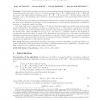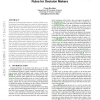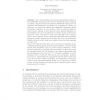324 search results - page 50 / 65 » Bounds for Functions of Dependent Risks |
INTEGRATION
2008
13 years 7 months ago
2008
Thermal gradients across the die are becoming increasingly prominent as we scale further down into the sub-nanometer regime. While temperature was never a primary concern, its non...
MOR
2010
13 years 5 months ago
2010
We study the convergence properties of an alternating proximal minimization algorithm for nonconvex structured functions of the type: L(x, y) = f(x)+Q(x, y)+g(y), where f : Rn → ...
CORR
2011
Springer
12 years 11 months ago
2011
Springer
Scoring rules for eliciting expert predictions of random variables are usually developed assuming that experts derive utility only from the quality of their predictions (e.g., sco...
PODS
2008
ACM
14 years 7 months ago
2008
ACM
A fundamental problem in distributed computation is the distributed evaluation of functions. The goal is to determine the value of a function over a set of distributed inputs, in ...
ALT
2006
Springer
14 years 4 months ago
2006
Springer
Most of the existing active learning algorithms are based on the realizability assumption: The learner’s hypothesis class is assumed to contain a target function that perfectly c...



